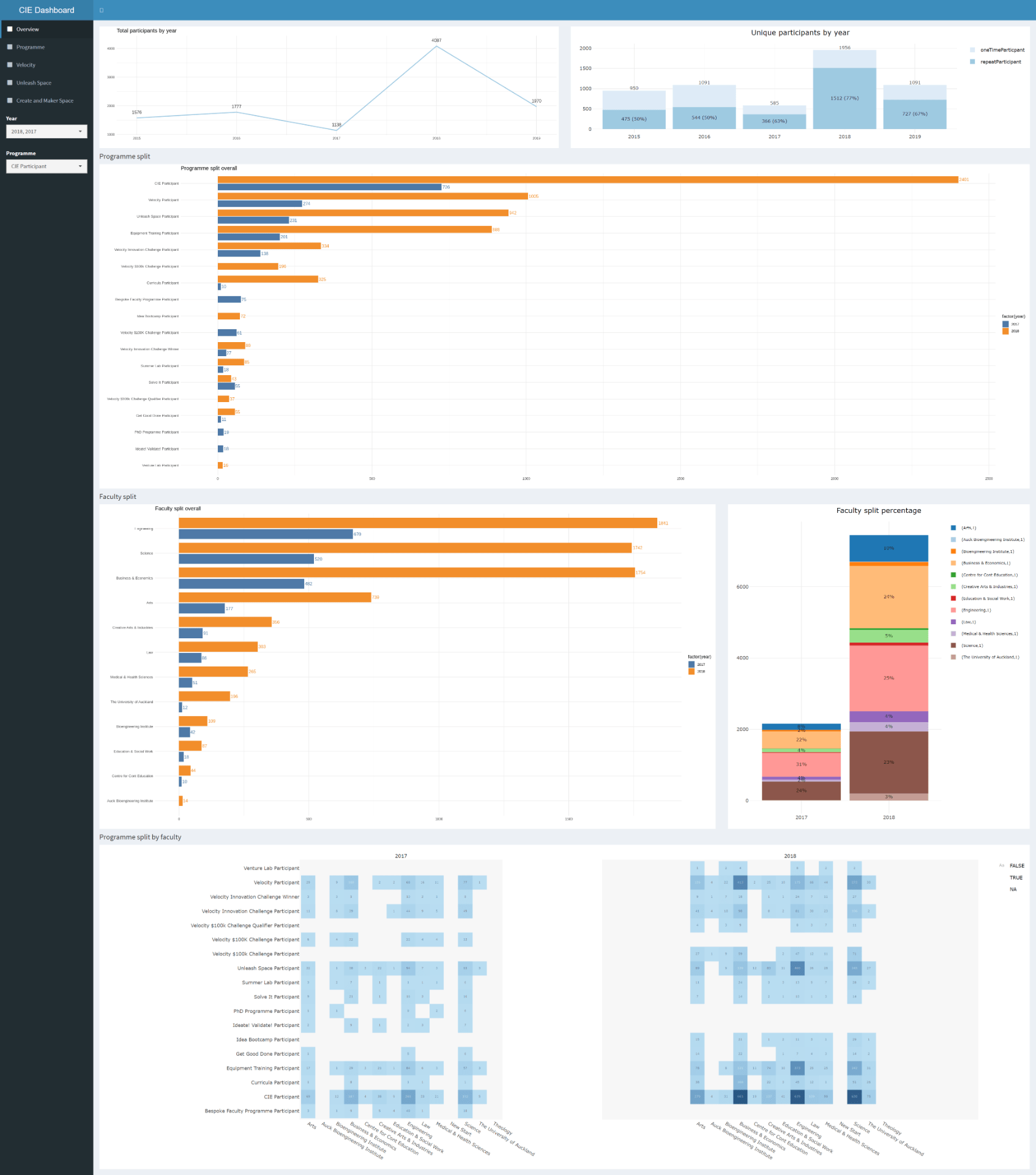
Measuring impact of entrepreneurship activities on students’ mindset, capabilities and entrepreneurial intentions
Darsel Keane, PhD Candidate, also Associate Director, The Centre for Innovation and Entrepreneurship; Ryan Huynh, Solution Analyst, Nick Young, Senior Solutions Specialist, Centre for eResearch.
 Background
Background
Darsel, Associate Director at the Centre for Innovation and Entrepreneurship (CIE), is also a PhD candidate in the Department of Management and International Business at the University. Her research interest is understanding and measuring the impact of entrepreneurship education programmes in developing participant’s entrepreneurial mindset and capabilities. In recent years “entrepreneurial mindset” has become an increasingly prevalent term, appearing in the media as well as in scholarly research. Notably, and the impetus for this research, there is increasing pressure for tertiary institutes to instil an entrepreneurial mindset in students. The call to develop this mindset is widespread including employers, students, educators as well as government organisations. Underpinning the interest in an entrepreneurial mindset is the belief that it will assist graduates in the face of the rapidly changing economy and world, irrespective of whether they start a new venture, become an employee or just as a basis for managing the uncertainty of the future. Universities have differentially responded to this interest by offering a variety of educational interventions. In a tertiary setting, the objective of entrepreneurship educational programmes and activities is to develop the entrepreneurial mindset and enterprising skills of participants, often with the aim of assisting participants to start and grow a venture and / or to have entrepreneurial roles in organisations. However, changes in either mindset or skills development are difficult to measure effectively, as existing tools rely on self-reporting data of attitudes and perceived level of knowledge (or entrepreneurial self-efficacy). Further, students self-select onto programmes and are typically more entrepreneurial than their peers. This project will develop a more effective method of assessing the impact of activities by combining behavioural and perceptual data. These behavioural data will be matched with assessments of student knowledge, skills and perceptions collected at several points (pre- and post-entry) over a defined period for a randomly selected panel of students.
Overview
With this goal in mind, Darsel is working with the Centre for eResearch (CeR) on integrating over a hundred of CIE’s programmes and activities data that have been running for the past few years. The aim is to develop interactive visualisations with the ability to analyse and measure entrepreneurship programmes hosted at CIE. The project outputs will be to provide compact, multi-slicer views (figure 1) which allow readers to gain insights into individual programme or multiple programmes comparison, as well as the relationship between activities/programmes and the demographic information of the students. In addition, a journey table is to be built to demonstrate the way participants have engaged in CIE programmes/activities, and possibly followed through to a number of destinations, which in turn can identify high, medium and low participation level from individual students.

A screen shot of the dashboard
Specific project objectives
This visualisation web is currently hosted at the University Nectar Cloud, which is managed by the Centre for eResearch. It supports the explanatory analyses for CIE’s programmes while bringing students engagement journies to life. The scope includes the following:
Interactive dashboards
- Developed as an end-to-end data pipeline where data can be inserted, cleaned, transformed and made ready for mapping.
- Based on design principles, the CeR Analyst will build informative and interactive visualisations that provide meaningful insights on programmes and participants. (see examples in figure 2, 3)
- Establishment of a user-friendly interface for CIE team members who may have little data or statistical knowledge, and who can use the system, and report on various programme and activity profiles.
Advise on data management and analytics
-
- CeR will advise on how data should be collected in order to meet data quality principles. This is to ensure high data quality is produced and recorded across all CIE programmes/activities, and is based on five-factor data quality framework (namely completeness, standards-based, consistency, accuracy, time-stamped).
- Provide an easy guide for interpretation of data.
- Train CIE staff to use different data analytics framework to navigate data analysis in an organised manner

Example of what information that the dashboard shows
Summary
With this tool, we anticipate that existing data can be better organised and analysed. With ongoing maintenance and continued improvement of data collection, we should be in a better position to build a more comprehensive, real-time tracking of the programmes and activities, and to assess their impact over time. The system information should also provide decision-making on programme design and offerings, in order to facilitate and foster an innovation culture and entrepreneurship at the University.